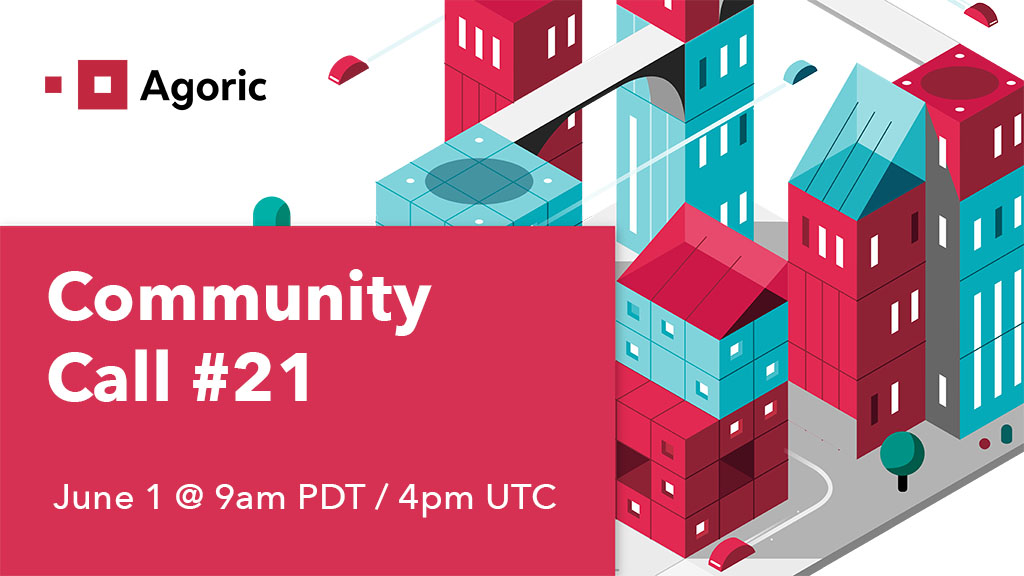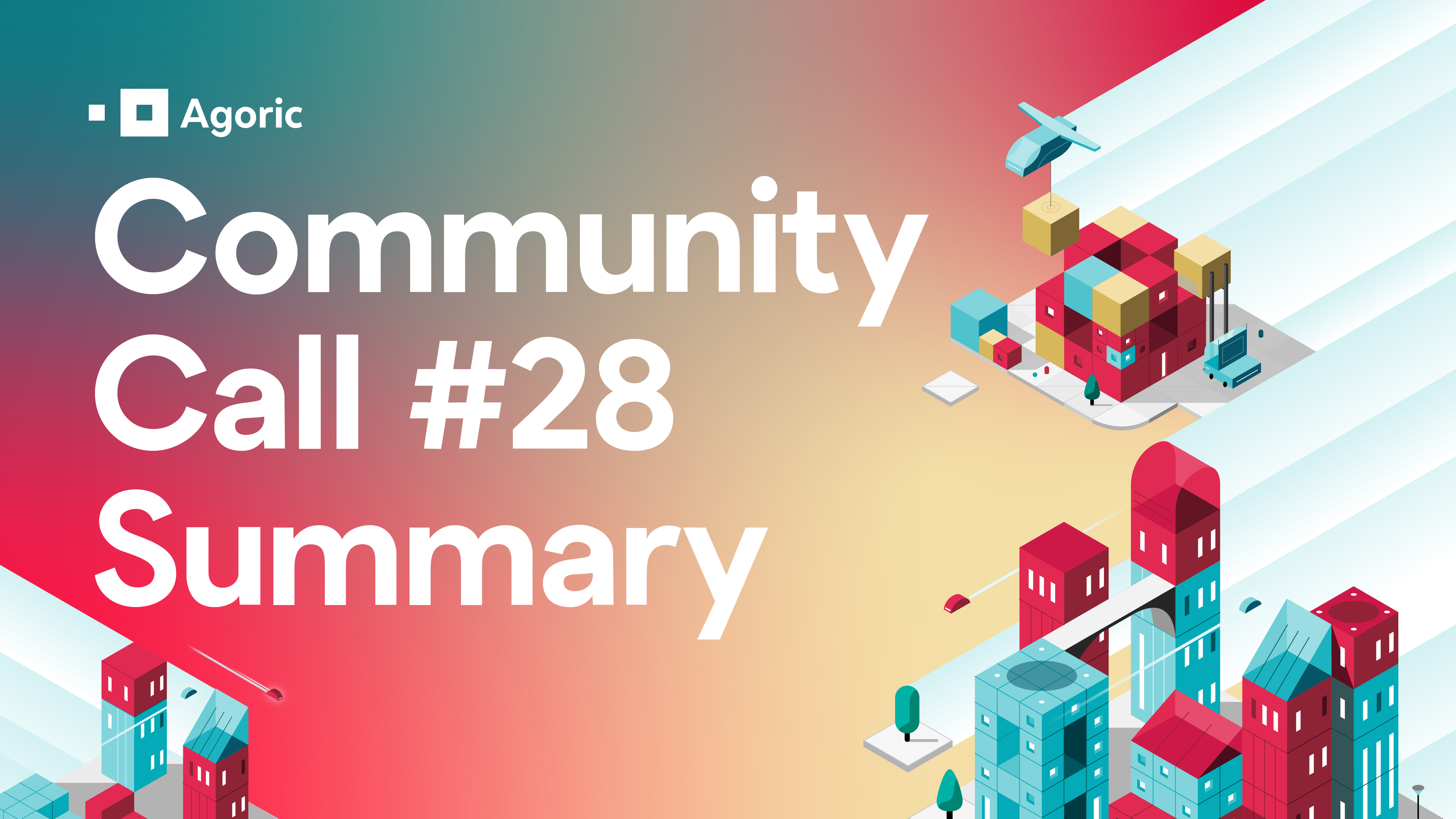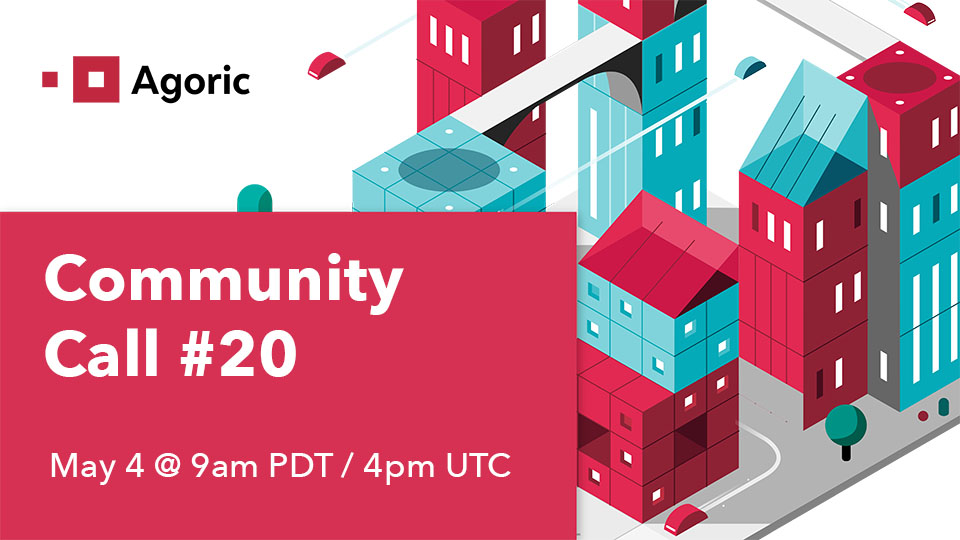Every monthly community call at Agoric provides the opportunity to talk through the ongoing activities in the Agoric community, and to answer questions we’ve been receiving from validators, partners, and others in the ecosystem. This month’s call covered BLD distribution, mainnet-1 updates, the Gateway Conference, updates from the DCF, and more.
If you weren’t among the community members who tuned into our 1 June 2022 Community Call, this post is intended as a summary of key items. Speakers included, from Agoric, Dean Tribble, CEO; Santiago Semino, Director of Marketing; Rowland Graus, Director of Product Management; and Jessy Irwin, Director of Security — plus Ric Shreves of the Decentralized Cooperation Foundation (dcfoundation.io).
Team Updates
We have three new people joining the team:
Director of Developer Relations
Marketing Manager
Intern to support economic testing, modeling, and data analysis for the Inter Protocol
You’ll get to know them more and see some of their work over the next few weeks and months.
CoinList BLD Sale: Second Round of Address Collection
Congratulations again to the over 48,000 BLD purchasers. We completed distribution to more than 46,000 in the first round. For the remaining 2,000 or so, CoinList is a second round of address collection.
The deadline to submit your address to CoinList is June 5, 2022, 23:59 UTC. If you aren’t able to submit your address as part of this round (for whatever reason, including if you submitted an incorrect/duplicate address), then we are working with CoinList for longer-term BLD integration into their platform, so you’ll have to wait for that.
Mainnet-1 and Inter Protocol update:
Dean and Rowland gave some insight into mainnet-1 and Inter Protocol progress.
The team is working on getting to mainnet-1 with the JavaScript VM and a smart contract execution engine with all of the economic services needed for Inter Protocol — all these are being combined with caution and care.
An internal release of all the Inter Protocol Code has been compiled, this will be handed off to external security auditors and for an external economic stress test in order to test liquidation scenarios, among other things.
The code for the Inter Protocol is largely in a complete state. The “gnomes in the code-mine” are working away, finishing off the contracts that make up the Inter Protocol. Dean also occasionally joins them.
Quick reminder: RUN protocol and $RUN, have been rebranded to Inter Protocol and $IST. You can view the Inter Protocol whitepaper.
One of the major engineering deliveries this month was sorting out the ability to read contract states without requiring a chain transaction. This is particularly important for anyone building a front end (e.g. to quote a price on an AMM, indexing data, etc.).
We’ve also made some improvements to the Inter Protocol itself:
The reserve now covers vault shortfalls on liquidation.
We now have a minimum liquidation requirement on the AMM.
And the vaults in the AMM data are now available via third party off-chain reporting.
The release date for mainnet-1 and Inter Protocol is on track for Q3 of 2022, but make sure you regularly check
for the latest developments
Detailed documentation around mainnet-1 and the Inter Protocol will be starting to come through for you all to peruse.
Security Update:
Jessy took us through some audit and security updates.
We’ve added several new items to pre-launch plans, which are reflected in the Community
.
In terms of application security, our roadmap remains largely the same:
We’ve kicked off an independent vulnerability assessment of Inter Protocol. This started in late May and will run through to mid-June. It will include source code inspection, automated testing, and manipulation of code.
We are in the process of booking assessments for the on-chain wallet and for the Cosmic Swingset.
In terms of economic resilience, we have plans to do more on this front, which will push out our target date for launch into the summer months:
We’ve spent time designing economic challenges and risks that we’d like to evaluate during the Economic Stress Test on devnet, and we’ll be taking a look at the entire Inter Protocol starting this month (June).
We are continuing to enumerate various economic risks, which we will pull together into an Economic Threat Model that walks through how the Inter Protocol design and various mechanisms account for many of the “What if?” and “What about this risk?” questions we’ve discussed since the Gateway event in Prague.
We’ve been continuing to invest in XS memory safety with Moddable, and we were accepted into Google’s OSS-Fuzz program, which provides resources to open source projects to conduct automated fuzzing. This has helped us surface some interesting crashes and issues we would have had a hard time finding on our own.
Our fuzzing efforts have been effective, and the Moddable team continues to be stellar at turning around fixes, and at investing in their own fuzzing setup.
The rate of crashes has begun to decrease, which means our efforts are paying off and we are finding fewer bugs. Discovery of bugs is starting to decrease.
As usual, keep an eye on the
for the latest vulnerability assessment reports. We aim to publish reports as quickly as we can, but it can take a few months to finalize a report, remediate issues that are found, and to do any follow up investigation and hardening.
Important note on Discord and Telegram security: we’re seeing reports of active malware campaigns, so please do not click or interact with any random messages/files that you may receive from strangers. Also: the Agoric team won’t be engaging with file attachments.
Community Engagement:
Make sure you’re signed up to
. This is where the bulk of governance discussions will be held. In particular, we want to highlight two recent threads:
Enabling inflation / Staking rewards — Enabling inflation — Commonwealth — Agoric
We intend to start ramping up participation in this thread, and expect you (BLD holders) to contribute as well!
Early validator compensation — Early validator compensation
KingSuper created a thread around compensation for early validators. Please contribute to this, too.
Remember to Stake!
Staking plays an important part in the Agoric ecosystem, and is in the best interests of all BLD holders. For how and why to stake, visit the
. Your job is to beat the DCF to the staking table. 😉
Cosmos Gateway Event:
This was a Cosmos-focused conference in mid-May. It took place in the beautiful city of Prague.
We used this fantastic opportunity to showcase Agoric and the Inter Protocol to an audience of crypto developers, users, and other interested parties — safe to say we generated a ton of interest.
Dean, our CEO, and Zaki Manian (co-founder of Iqlusion and Sommelier Protocol) had a special session on Inter Protocol around its mechanics:
.
Dean gave a more general session regarding the Agoric platform:
.
Decentralized Cooperation Foundation (DCF) update:
Ric from the DCF gave a quick update on the latest exciting news regarding DCF activities.
DCF announced its first delegation round on 4 May 2022, and opened up applications for validators shortly thereafter. A total of 82 applications were submitted before the deadline of 23 May 2022.
Since then, DCF has been carefully reviewing applications, ranking validators based on things such as security risk, operational risk, network diversity, % of voting shares involvement in previous efforts, whether the validator was an incentivized testnet participant or not, and so on. The application process was extensive and had a heavy focus on security.
DCF will be sending out email announcements to everyone who applied by noon EST on 1 June 2022.
Some stats regarding the applications:
80 out of 82 applications were valid.
36 out of the 80 valid applications were selected to receive DCF delegation.
34 out of the 36 selected are current validators, with 3 being new.
25 of the 36 selected validators participated in the incentivized testnet.
2 out of 3 selected validators are new to the Cosmos validator ecosystem.
Although DCF set out to have 50 validators receive delegation, only 36 applicants met the criteria well enough.
The DCF intends to be dynamic about staking practices, so adjustments will be made in line to increase diversity and balance, and to uphold the expectations set out in the application.
DCF will be present at Consensus this year in Austin, so come say hello to Ric, and feel free to reach out to him via
in the meantime.
DCF has seeded the initial Board of Directors, who are Jason Potts, Zaki Manian, and Dean Tribble — with 2 vacant seats yet to be filled.


